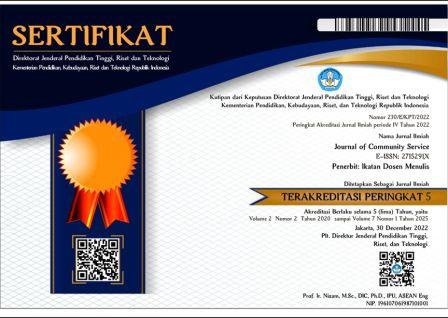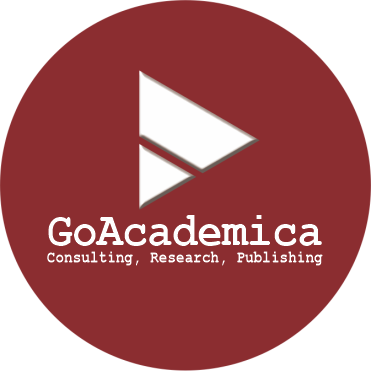Editorial Policies
Journal of Community Service is open access and peer-reviewed Journal. JCS is a scientific journal that contains the results of theoretical research and studies on Community and Community Service. Managed by GlobalWriting Academica Consulting and Publishing.
Peer Review Process Manuscripts submitted to JCS will undergo a selection and assessment process by the Board of Editors to ensure their accordance with the writing guideline, focus, and scope and that they are of excellent academic quality. The manuscripts will be reviewed using the double-blind peer review method, in which case neither authors nor reviewers know each other’s identities.
Desk Review. At the desk review stage, the manuscript will examine manuscripts to ensure they have met the writing guideline, focus, and scope with excellent academic quality. If they do not meet the conditions, the author will be allowed to revise their manuscript according to the given criteria. However, there is also the possibility that the manuscript will be directly rejected.
Peer review. When the manuscript has passed the desk review stage, it will then be delivered to reviewers who are experts in the field of the submitted manuscript. The review process will be done within four weeks or 40day(s). Manuscripts that did not successfully pass the desk review process will not proceed to this stage.
Reviewer’s Decision. The reviewers will provide the following recommendations:
- Accepted; means that the manuscript is acceptable for publication
- Accepted with minor revisions; means that the manuscript is acceptable for publication once revised in response to the reviewers’ concerns.
- Accepted with major revisions means that substantive inadequacies in the manuscript, such as data analysis, the main theory used, and rewriting of paragraphs, need to be revised.
- Rejected; means that the manuscript is not acceptable for publication or the given reviews relate to very basic issues.
The Board of Editors will consider the reviewer’s decision to determine the ensuing process of the manuscript.
Revision Stage. Once the manuscript has been received with notations of minor or major revisions, it will be returned to the author with a review summary form. For manuscripts accepted with major revisions, authors are allotted four weeks to revise. Whereas for manuscripts accepted with minor revisions, two weeks are allotted for revision. When returning the revised manuscript, the author must fill in and attach the review summary form.
Final decision. At this stage, the manuscript will be re-evaluated by the Board of Editors to ensure that the author has revised it in response to the reviewers’ concerns. The manuscript may still be rejected in this final decision if the author did not seriously conduct the revisions necessary.
Proofread. Once the manuscript has been deemed acceptable by the Board of Editors, it will undergo a proofreading process to maintain linguistic quality.
Publication confirmation. At this stage, the final layout of the manuscript will be resent to the author to ensure that the content is under the author’s writing. The author may revise any typographical error found in the final manuscript at this stage. Once confirmation from the author is given, the Editorial Secretary will process the manuscript for online publication on the website and print publication.
Publication Frequency
JCS publishes two times a year, i.e., in June and December.
Ethics and Malpractice Statement
Duties of Authors
1. Reporting Standards: Authors of reports of original research should present an accurate account of the work performed and an objective discussion of its significance. Underlying data should be represented accurately in the paper. A paper should contain sufficient detail and references to permit others to replicate the work. Fraudulent or knowingly inaccurate statements constitute unethical behavior and are unacceptable.
2. Data Access and Retention: Authors may be asked to provide the raw data with a paper for editorial review. They should be prepared to provide such data within a reasonable time.
3. Originality and Plagiarism: The authors should ensure that they have written entirely original works. If the authors have used the work and/or words, this has been appropriately cited or quoted.
4. Multiple, Redundant or Concurrent Publication: An author should not generally publish manuscripts describing the same research in more than one journal or primary publication. Submitting the same manuscript to more than one Journal concurrently constitutes unethical publishing behavior and is unacceptable.
5. Acknowledgement of Sources: Proper acknowledgment of the work of others must always be given. Authors should cite publications that have been influential in determining the nature of the reported work.
6. Authorship of the Paper: Authorship should be limited to those who have contributed to the conception, design, execution, or interpretation of the reported study. All those who have made significant contributions should be listed as co-authors. Where others have participated in certain substantive aspects of the research project, they should be acknowledged or listed as contributors. The corresponding author should ensure that all appropriate co-authors and no inappropriate co-authors are included in the paper. All co-authors have seen and approved the final version of the paper and have agreed to its submission for publication.
7. Disclosure and Conflicts of Interest: All authors should disclose in their manuscript any financial or another substantive conflict of interest that might be construed to influence the results or interpretation of their manuscript. All sources of financial support for the project should be disclosed.
8. Fundamental Errors in Published Works: When an author discovers a significant error or inaccuracy in their published work, the author should promptly notify the journal editor or publisher and cooperate with the editor to retract or correct the paper.
9. Hazards and Human or Animal Subjects: If the work involves chemicals, procedures, or equipment with any unusual hazards inherent in their use, the author must identify these in the manuscript.



















